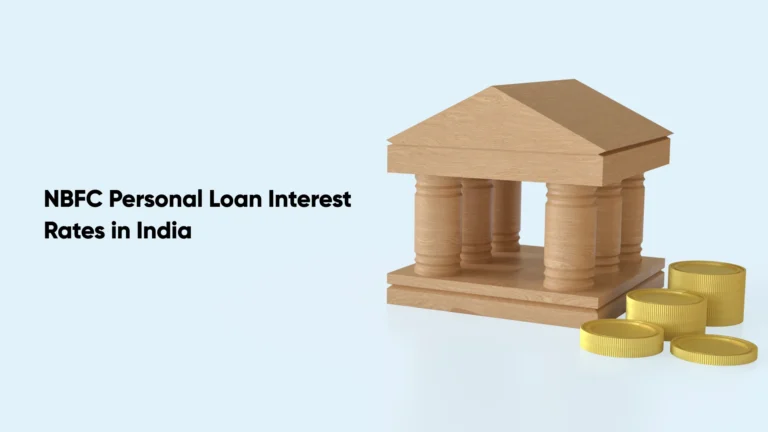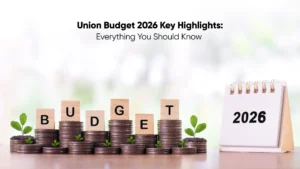NBFC stands for Non-Banking Financial Company. These institutions provide financial services such as loans, credit facilities, and investments, but unlike banks, they do not hold a banking license or accept demand deposits. Instead, NBFCs focus on making credit more accessible, especially for people who might find it difficult to get loans from traditional banks.
An NBFC personal loan is an unsecured loan offered by these institutions to meet a variety of personal needs, whether it’s a medical emergency, higher education, travel, or even consolidating existing debts. While they work much like bank personal loans, the key difference is in their flexibility. NBFCs often have simpler eligibility norms, faster disbursals, and a more digital-first approach. This makes them especially appealing for salaried employees, self-employed professionals, freelancers, and gig workers who may not fit the strict criteria of banks.
In recent years, NBFCs have emerged as a major driver of credit growth in India. Their ability to combine minimal paperwork, quick approvals, and customized loan offerings has made them the go-to option for millions of borrowers.
Table of Contents
ToggleWhat are the NBFC Personal Loan Interest Rates?
NBFC personal loan interest rates vary widely depending on the borrower’s profile and the lender’s internal policies. Typically, Non-Banking Financial Companies determine rates by considering several factors: your credit score, income level, loan tenure, repayment history, and the loan amount requested. Borrowers with a high CIBIL score (750+) are more likely to receive lower NBFC loan interest rates, while those with lower scores may pay higher rates to offset risk.
Loan tenure also plays a big role. Shorter tenures generally attract lower total interest outgo but higher monthly EMIs, whereas longer tenures reduce monthly strain but increase overall interest costs. Similarly, salaried individuals with stable incomes often enjoy better NBFC loan rate of interest compared to self-employed applicants with fluctuating income. Each NBFC has its own risk assessment methods, but most maintain transparency in disclosing their rate slabs and charges upfront.
Fixed vs Floating Interest Rates in NBFC Loans
When you take an NBFC personal loan, the interest is of two main types: fixed or floating.
Fixed Interest Rate:
The rate stays the same for the entire loan period. For instance, if you borrow ₹2 lakh at 15% for 3 years, your EMI won’t change every month. This makes it easier to plan your budget since you know exactly how much you’ll pay.
Floating Interest Rate:
The rate changes as per market conditions, usually linked to the RBI repo rate. If the repo rate goes up, your EMI increases. If it comes down, your EMI reduces.
Go for fixed rates if you want stability and don’t want surprises in your monthly payments. Choose floating rates if you’re comfortable with some ups and downs and want to benefit when interest rates fall.
Also Read: Fixed vs. Floating interest rate on Personal loan
Typical NBFC Personal Loan Interest Rate Ranges in India
Looking for a quick snapshot of what NBFCs charge these days? Here’s an easy-to-read guide showing the latest interest rates, loan amounts, and processing fees for some of India’s top NBFCs.
NBFC | Interest Rate (p.a.) | Loan Amount Range | Processing Fee |
Tata Capital | ~11.50% – 35% | ₹75,000 – ₹25 lakh | Up to ~5.5% of loan amount |
IIFL Finance | 12.75% – 44% p.a. | ₹5,000 – ₹5 lakh | 2% – 9% + GST |
Mahindra Finance | Starting ~10.49%; up to ~30–31% | ₹50,000 – ₹15 lakh | 2% of loan amount |
Aditya Birla Capital | Starting ~10.99% p.a.; up to ~28–30% | Up to ₹50 lakh (varies) | Up to ~4% |
Bajaj Finserv | ~10% – 31% p.a. | ₹40,000 – ₹55 lakh | Up to ~3.9% |
Factors Affecting NBFC Loan Interest Rates
When you apply for an NBFC personal loan, the interest rate you get may not be the same as what’s advertised. Your exact rate of interest is based on your financial profile and risk factors. Here are the key things that matter:
- Credit Score: Your credit score is one of the biggest factors. A score above 750 usually signals that you’re a low-risk borrower, which means NBFCs are more likely to offer you lower interest rates. On the other hand, if your score is below 680, you may face higher rates or stricter terms.
- Loan Tenure: The duration of your loan also affects rates. Shorter tenures (like 12–24 months) may come with lower rates because the NBFC’s risk is limited. Longer tenures (like 4–5 years) reduce your monthly EMI but can increase the overall interest cost, sometimes with slightly higher rates.
- Income Stability: Lenders look for regular and steady income. Salaried professionals with a fixed monthly salary are generally offered better rates. For example, someone with a ₹50,000 stable salary is likely to get a lower rate than a freelancer earning variable amounts.
- Employment Type & Employer Profile: Working with a reputed organisation or in a government job improves your chances of securing lower NBFC loan interest rates. That’s because lenders trust that your income is more secure compared to gig workers or those employed in smaller firms.
- Existing Relationship with the NBFC: If you are already an NBFC customer, for instance, if you’ve taken a loan earlier and repaid it on time, you may be eligible for special offers, pre-approved loans, or even lower processing fees. This loyalty factor helps NBFCs trust you more, rewarding you with better terms.
Comparing NBFC Personal Loans Vs Bank Personal Loans
When it comes to personal loans, borrowers in India have two main choices: banks and Non-Banking Financial Companies (NBFCs). While both serve the same purpose of providing quick credit, the way they operate can feel very different. Knowing these differences can help you pick the option that suits your needs best.
Aspect | NBFC Personal Loan | Bank Personal Loan |
Interest Rates | Usually slightly higher than banks, but can be negotiated based on your profile. | Generally lower and more rigid, with standard slabs based on income and credit score. |
Processing Time | Very fast, often within 24 to 48 hours | Slower. 3 to 7 working days due to multiple verification steps. |
Eligibility | More flexible. Borrowers with lower CIBIL scores or informal income sources can qualify. | Stricter. Banks prefer salaried applicants with strong credit scores (750+). |
Documentation | Minimal. Mostly PAN, Aadhaar, and bank statements, uploaded digitally. | More paperwork. Salary slips, IT returns, and in-person verification is required. |
Loan Flexibility | High. NBFCs often offer customized tenures, top-ups, and pre-approved offers. | Moderate. Banks follow standard tenure and policy structures with less flexibility. |
Go with an NBFC if you need quick access to funds, have a lower credit score, or prefer a hassle-free digital process. For example, if you face a sudden medical emergency, NBFCs are better equipped to disburse money within a day. Choose a bank loan if your credit score is strong and you’re looking for lower interest rates over the long term. This is ideal if you’re planning a structured expense like a home renovation or higher education.
Eligibility Criteria for NBFC Personal Loans in India
While requirements may vary across lenders, common eligibility criteria include:
- Age: Be between 18-58 years
- Minimum Monthly Income: ₹15,000 – ₹25,000 depending on lender
- Employment: Salaried, self-employed, or gig workers with steady inflows
- Credit Score: Preferably 680+ (750+ for best rates)
- Documents: PAN, Aadhaar, bank statements, salary slips/ITR
How to Apply for an NBFC Personal Loan: Step-by-Step Guide
Applying for an NBFC personal loan is quick and largely digital. Most lenders now let you complete the entire journey from your phone or laptop, with minimal paperwork. Here’s a simple step-by-step guide to make the process smoother:
- Check Eligibility: Visit the NBFC’s website or app and see if you meet the basic requirements (age, income, credit score). Some NBFCs even have instant eligibility checkers that don’t affect your credit score.
- Compare Interest Rates & Offers: Don’t settle for the first option. Use loan comparison platforms or check multiple NBFCs directly to find the lowest NBFC loan interest rates and best terms for your profile.
- Fill Out the Online Application: Enter your personal details (name, address, employment, income) accurately. Most NBFCs provide a short, user-friendly form that takes just a few minutes.
- Upload Required Documents: Commonly needed documents include PAN, Aadhaar, salary slips or IT returns, and 3–6 months’ bank statements. For smaller loan amounts, only PAN and Aadhaar may suffice.
- Get Approval Decision: Many NBFCs use automated credit assessment tools to give you instant approval (within 60 seconds in some cases). If more checks are needed, it usually takes less than a day.
- Receive Loan Disbursal: Once approved, the loan amount is transferred directly to your bank account, typically within 24 to 48 hours.
Benefits of Choosing NBFC Personal Loans
NBFC personal loans have gained popularity because they combine convenience with flexibility. Unlike traditional bank loans that may involve long approval cycles and strict eligibility checks, NBFCs focus on making credit faster and more accessible. Here are some of the biggest benefits:
1. Faster Processing & Disbursal:
Most NBFC lenders provide instant approval within minutes, and once your loan is approved, the money is often credited to your account within 24–48 hours. This makes them an ideal choice for urgent needs like medical expenses or last-minute travel.
2. Flexible Eligibility Criteria:
Banks typically insist on high credit scores and long employment history. In contrast, NBFCs often extend personal loans to salaried employees, self-employed individuals, freelancers, and even gig workers, making them more inclusive.
3. Customizable Loan Tenure:
Borrowers can choose repayment periods ranging from 6 months to 60 months, depending on their repayment capacity. This flexibility allows borrowers to tailor the loan to their financial comfort.
4. Digital & Paperless Onboarding:
Most NBFCs now follow a 100% digital process, right from eligibility checks to e-KYC and document uploads. This reduces paperwork and saves time, enabling borrowers to apply from anywhere without visiting a branch.
5. Possibility of Negotiable Rates:
If you are an existing customer or a repeat borrower, NBFCs may offer better interest rates, reduced processing fees, or pre-approved offers. Maintaining a good repayment record can further improve your chances of negotiating favorable terms.
Common Fees and Charges in NBFC Personal Loans
When you take a personal loan from an NBFC, the interest rate is one part of the loan. There are a few extra costs that can add up, and being aware of them helps you plan better. Here are the most common ones:
- Processing Fee: Usually 2% to 6% of the loan amount, which is deducted upfront when the loan is disbursed. For example, if you borrow ₹1 lakh and the processing fee is 3%, you’ll actually receive ₹97,000 in your account.
- Prepayment or Foreclosure Charges: If you want to repay your loan early to save on interest, some NBFCs may charge a penalty (often 2%–5% of the outstanding amount). It’s best to confirm these terms before signing.
- Late Payment Charges: Missed an EMI? You’ll likely be charged extra, typically around 2% per month on the overdue amount. Consistently paying on time avoids this cost and protects your credit score.
- Documentation Fees: While many NBFCs have gone paperless, a few still charge for paperwork or legal verification.
Also Read: Personal Loan Interest Rates, Fees & Charges in India
Tips to Get the Best NBFC Loan Interest Rates
Want to save money on your NBFC personal loan? The good news is, a little preparation can go a long way. By improving your financial profile and making smart choices, you can bring down your interest rate and reduce your overall loan cost. Here are some practical tips:
1. Maintain a Healthy Credit Score:
Your credit score is the first thing NBFCs look at. Build a score of 750 or above to qualify for the best rates. Simple habits like paying EMIs and credit card bills on time, and keeping your credit utilisation below 30%, to boost your score steadily.
2. Compare Before You Commit:
Don’t rush into the first loan offer you get. Spend time comparing interest rates, processing fees, and repayment terms across different NBFCs. A small difference in rates, say 1%, can save you thousands over the loan tenure.
3. Negotiate Using Your Profile:
If you have a stable income or a long relationship with the NBFC, use it to your advantage. Many lenders are open to reducing rates or fees for reliable, repeat borrowers. It never hurts to ask.
4. Pick the Right Tenure:
Shorter tenures mean higher EMIs but lower total interest, while longer tenures give breathing space but increase overall cost. Strike a balance by choosing a tenure that keeps EMIs comfortable without paying too much extra interest.
5. Borrow Smartly:
Take only the amount you actually need. Higher loan amounts not only increase your EMI but may also push your applicable interest rate upward. Borrowing wisely ensures you don’t pay for more debt.
Frequently Asked Questions
What Is The Minimum And Maximum Personal Loan Interest Rate Offered By NBFC In India?
NBFC personal loan interest rates generally range from 10% to 36% per annum, depending on the lender and your profile. On Zype, you can get loans starting from around 1.5% per month (~18% p.a.), making it easier to access credit at competitive rates.
Are NBFC Personal Loan Interest Rates Higher Than Banks? Why?
Yes, NBFCs usually charge slightly higher rates than banks. This is because they take on more risk by lending to people who may not meet strict bank criteria. However, platforms like Zype balance this with faster approvals, flexible eligibility, and fully digital processing.
Can I Negotiate My NBFC Personal Loan Interest Rate?
In many cases, yes. If you have a high credit score, stable income, or are an existing customer, you can request better terms. With Zype, repeat borrowers and those with good repayment history often receive personalized offers at lower rates.
Do NBFCs Charge Prepayment Fees On Personal Loans?
Some NBFCs charge a prepayment or foreclosure penalty, usually ranging between 2%–5% of the outstanding loan amount. With Zype, all charges are clearly displayed upfront, so you know exactly what applies before applying.
How Does My Credit Score Impact The NBFC Loan Rate Of Interest?
Your CIBIL score is a key factor. A score of 750+ can get you the favourable interest rates, while lower scores may result in higher rates to cover risk. On Zype, you can still apply even with a moderate score, but improving it can unlock better offers.
What Documents Do NBFC Require For Personal Loan Approval?
Most NBFCs, including Zype, keep the process simple. You typically need to provide your PAN, Aadhaar, bank statements, and income proof (salary slip or ITR). On Zype, the entire KYC is digital and paperless, so approvals happen in just a few minutes.








